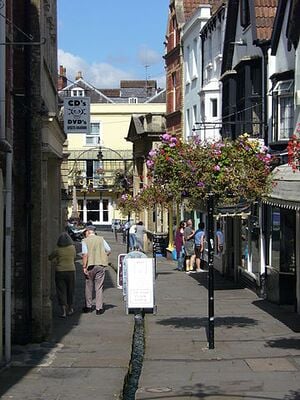Opposing supermarket developments and promoting local shops in the UK

This is an introductory article only. More detailed information can be found via the external sites and resources refered to in the article.
Learning from others[edit | edit source]
A great place to start and full of relevant and useful information is tescopoly.[1] They also have information about local campaigns.[2]
Staying power as well as resolve[edit | edit source]
The threat of what might be regarded as inappropriate development can last for years. Even if a particular application is withdrawn it can be followed by fresh ones.
Considering impacts[edit | edit source]
What do you or your group think will be the impacts of the proposed development? As well as shopping, business and economic aspects, such as "vitality and viability" of town centres, job creation (and loss), consider also transport, climate change and environmental impacts. Are there impacts on walking and cycling? What would be the impacts on the elderly population? Are there special events locally, eg Festivals and will these be affected?
There may be a variety of plans and strategies for a wider area of which your community is part. Are there any specific parts of these with which any aspect of the proposed development might conflict?
Communicating with local authorities[edit | edit source]
Has your local authority done a recent health check on the high street or other potentially affected shopping centres?
Gathering support[edit | edit source]
Who locally might support your campaign? Residents, shoppers, small shops, small businesses, local politicians, local MP, local MEP, local celebrities?
Conflict resolution[edit | edit source]
Always aim to foster good relationships with others affected even when there are divergent views. Depending on circumstance you or your group may wish to learn more about conflict resolution[3] techniques.
Smart campaigning[edit | edit source]
Learn what you can about successful ways of campaigning. Consider what use could be made of all local media to spread the word about your campaign and gather support. Remember to involve local blogs and other local social media sites, and / or start one up yourself specific to your campaign. Maybe set up a Facebook group or page. Look at examples of social media used by other similar campaigns. Some areas of the country have 'social media surgeries'[4] which may help if you feel you need to learn more about social media.
Remind yourself that there are success stories[edit | edit source]
Tescopoly has lots of information about these.[5] Remind yourselves regularly.
Developing alternative visions for your area[edit | edit source]
Developing a view of what you or your group are for, as well as what you might be against, if you feel you can tackle this, can help generate feelings of being more empowered. Communication with other parties for example councils can go better if there are aware of other positive visions for the area. See also Resources and external links below.
Action to level the playing field[edit | edit source]
From time to time there may be wider action or campaigns, perhaps national ones to redress a percieved imbalance. Currently (December 2011) for example Local Works[6] is calling on the government to agree to implement a proposal made under the Sustainable Communities Act. 1,100 Town and Parish Councils across the country have formally given their support to the proposal. Local Works has published an action briefing for MPs which contains the full proposal and rationale, which can be viewed via their website.
Awareness of relevant trends[edit | edit source]
These may or may not be relevant at present but may have an impact in the future. These might include for example the growth of online shopping, and oil supplies (peak oil)
Quotes[edit | edit source]
"... John Howell, MP, "architect of the reform of the planning system" stated that "running the High Street is the job of the local community and this should be reflected in neighbourhood plans". "[7]
Sharing back and paying it forward[edit | edit source]
All campaigns benefit from being able to learn from those that have gone before. As your campaign progresses share what you can of what you learn. Others will benefit from hearing your story.
Resources[edit | edit source]
- Campaign resources from Tescopoly
- How to respond to planning applications, Campaign to Protect Rural England (cpre), September 2011
- How to...oppose a supermarket planning application, (PDF), Nov 21, 2005, Friends of the Earth
- Planning Aid, Planning Aid[8] provides free urban and environmental planning advice to individuals and community groups who cannot afford to pay a professional consultant, via a number of charitable organizations throughout the UK. A similar scheme, Community Technical Aid, operates in part of Ireland.
- The Saxondale Manifesto, A Future for Frome, June 2011
- Social Media Surgery Plus
- Positive alternatives: supporting local shops, from Tescopoly
- How to fight a supermarket planning application, Aidan Fortune, Convenience Store, 15 November 2010, thegrocer.co.uk
News and comment[edit | edit source]
2014
The Power of a Plan B, November 2[9]
Breaking the chains on high streets: A movement for independent local loyalty cards plans to go nationwide, April 13[10]
Why I despise self checkouts with a rare and unbridled passion, April 10
Feed Ourselves (Real) Food – It's Time to Make Changes, April 6[11]
Goodbye to supermarkets? April 1[12]
Britain's big grocers are on the run – and shoppers are hungry for a change, March 19[13]
2012
Totnes High Street, December 14, by Jay Tompt[14]